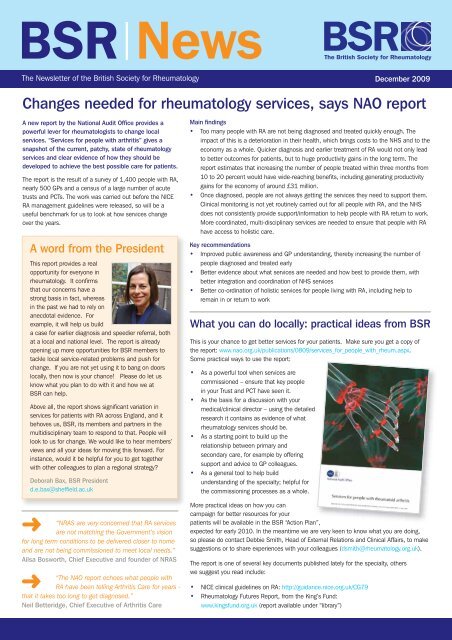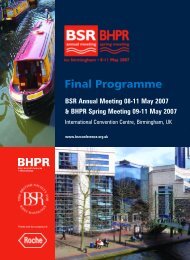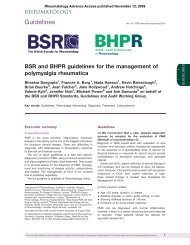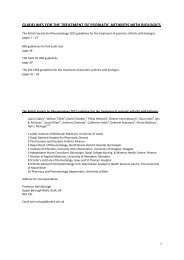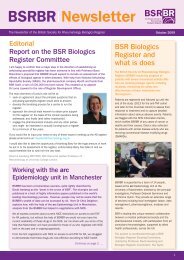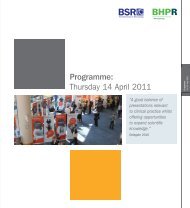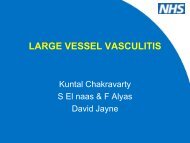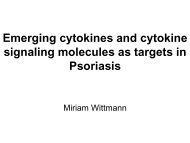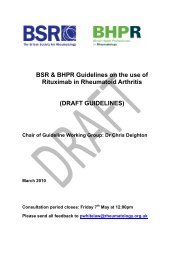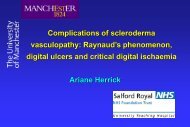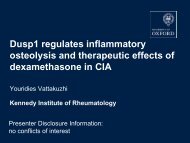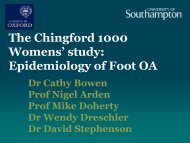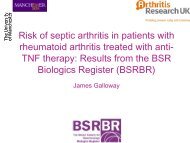December 2009 - The British Society for Rheumatology
December 2009 - The British Society for Rheumatology
December 2009 - The British Society for Rheumatology
Create successful ePaper yourself
Turn your PDF publications into a flip-book with our unique Google optimized e-Paper software.
BSR|News<br />
<strong>The</strong> Newsletter of the <strong>British</strong> <strong>Society</strong> <strong>for</strong> <strong>Rheumatology</strong><br />
BSR<br />
<strong>The</strong> <strong>British</strong> <strong>Society</strong> <strong>for</strong> <strong>Rheumatology</strong><br />
<strong>December</strong> <strong>2009</strong><br />
Changes needed <strong>for</strong> rheumatology services, says NAO report<br />
A new report by the National Audit Office provides a<br />
powerful lever <strong>for</strong> rheumatologists to change local<br />
services. “Services <strong>for</strong> people with arthritis” gives a<br />
snapshot of the current, patchy, state of rheumatology<br />
services and clear evidence of how they should be<br />
developed to achieve the best possible care <strong>for</strong> patients.<br />
<strong>The</strong> report is the result of a survey of 1,400 people with RA,<br />
nearly 500 GPs and a census of a large number of acute<br />
trusts and PCTs. <strong>The</strong> work was carried out be<strong>for</strong>e the NICE<br />
RA management guidelines were released, so will be a<br />
useful benchmark <strong>for</strong> us to look at how services change<br />
over the years.<br />
A word from the President<br />
This report provides a real<br />
opportunity <strong>for</strong> everyone in<br />
rheumatology. It confirms<br />
that our concerns have a<br />
strong basis in fact, whereas<br />
in the past we had to rely on<br />
anecdotal evidence. For<br />
example, it will help us build<br />
a case <strong>for</strong> earlier diagnosis and speedier referral, both<br />
at a local and national level. <strong>The</strong> report is already<br />
opening up more opportunities <strong>for</strong> BSR members to<br />
tackle local service-related problems and push <strong>for</strong><br />
change. If you are not yet using it to bang on doors<br />
locally, then now is your chance! Please do let us<br />
know what you plan to do with it and how we at<br />
BSR can help.<br />
Above all, the report shows significant variation in<br />
services <strong>for</strong> patients with RA across England, and it<br />
behoves us, BSR, its members and partners in the<br />
multidisciplinary team to respond to that. People will<br />
look to us <strong>for</strong> change. We would like to hear members’<br />
views and all your ideas <strong>for</strong> moving this <strong>for</strong>ward. For<br />
instance, would it be helpful <strong>for</strong> you to get together<br />
with other colleagues to plan a regional strategy?<br />
Deborah Bax, BSR President<br />
d.e.bax@sheffield.ac.uk<br />
➜<br />
“NRAS are very concerned that RA services<br />
are not matching the Government’s vision<br />
<strong>for</strong> long term conditions to be delivered closer to home<br />
and are not being commissioned to meet local needs.”<br />
Ailsa Bosworth, Chief Executive and founder of NRAS<br />
➜<br />
“<strong>The</strong> NAO report echoes what people with<br />
RA have been telling Arthritis Care <strong>for</strong> years -<br />
that it takes too long to get diagnosed.”<br />
Neil Betteridge, Chief Executive of Arthritis Care<br />
Main findings<br />
• Too many people with RA are not being diagnosed and treated quickly enough. <strong>The</strong><br />
impact of this is a deterioration in their health, which brings costs to the NHS and to the<br />
economy as a whole. Quicker diagnosis and earlier treatment of RA would not only lead<br />
to better outcomes <strong>for</strong> patients, but to huge productivity gains in the long term. <strong>The</strong><br />
report estimates that increasing the number of people treated within three months from<br />
10 to 20 percent would have wide-reaching benefits, including generating productivity<br />
gains <strong>for</strong> the economy of around £31 million.<br />
• Once diagnosed, people are not always getting the services they need to support them.<br />
Clinical monitoring is not yet routinely carried out <strong>for</strong> all people with RA, and the NHS<br />
does not consistently provide support/in<strong>for</strong>mation to help people with RA return to work.<br />
More coordinated, multi-disciplinary services are needed to ensure that people with RA<br />
have access to holistic care.<br />
Key recommendations<br />
• Improved public awareness and GP understanding, thereby increasing the number of<br />
people diagnosed and treated early<br />
• Better evidence about what services are needed and how best to provide them, with<br />
better integration and coordination of NHS services<br />
• Better co-ordination of holistic services <strong>for</strong> people living with RA, including help to<br />
remain in or return to work<br />
What you can do locally: practical ideas from BSR<br />
This is your chance to get better services <strong>for</strong> your patients. Make sure you get a copy of<br />
the report: www.nao.org.uk/publications/0809/services_<strong>for</strong>_people_with_rheum.aspx.<br />
Some practical ways to use the report:<br />
• As a powerful tool when services are<br />
commissioned – ensure that key people<br />
in your Trust and PCT have seen it.<br />
• As the basis <strong>for</strong> a discussion with your<br />
medical/clinical director – using the detailed<br />
research it contains as evidence of what<br />
rheumatology services should be.<br />
• As a starting point to build up the<br />
relationship between primary and<br />
secondary care, <strong>for</strong> example by offering<br />
support and advice to GP colleagues.<br />
• As a general tool to help build<br />
understanding of the specialty; helpful <strong>for</strong><br />
the commissioning processes as a whole.<br />
More practical ideas on how you can<br />
campaign <strong>for</strong> better resources <strong>for</strong> your<br />
patients will be available in the BSR “Action Plan”,<br />
expected <strong>for</strong> early 2010. In the meantime we are very keen to know what you are doing,<br />
so please do contact Debbie Smith, Head of External Relations and Clinical Affairs, to make<br />
suggestions or to share experiences with your colleagues (dsmith@rheumatology.org.uk).<br />
<strong>The</strong> report is one of several key documents published lately <strong>for</strong> the specialty, others<br />
we suggest you read include:<br />
• NICE clinical guidelines on RA: http://guidance.nice.org.uk/CG79<br />
• <strong>Rheumatology</strong> Futures Report, from the King’s Fund:<br />
www.kingsfund.org.uk (report available under “library”)
<strong>Society</strong>|News<br />
BSR Biologics Register<br />
We are entering an exciting new phase of a project which<br />
started eight years ago.<br />
Following the independent proposal submitted to us by<br />
Professor Barry Bresnihan, we are now actively seeking to<br />
establish an ankylosing spondylitis register. We recruited Lorna<br />
Layward to help with the setting up of the project. Funds <strong>for</strong><br />
Lorna’s appointment (one year in the first instance) have been<br />
raised from industry, NASS and BSR itself. She will organise the<br />
<strong>for</strong>mal advertising <strong>for</strong> a rheumatology centre to undertake the<br />
project, a review and interview panel <strong>for</strong> applications received,<br />
ensuring that the register is established to ask a set of scientific<br />
questions and that it obtains the support of the local clinical<br />
trials network. Lorna and I, together with Nia Taylor, the overall<br />
Biologics Register manager, have already started to engage the<br />
pharmaceutical companies to establish the level of their<br />
interests (and we hope their support!).<br />
We are concomitantly talking to pharmaceutical companies<br />
whose biologic agents are now going through a rather torturous<br />
process to gain NICE approval. NICE strongly recommends the<br />
BSRBR model as a means of establishing long-term pharma<br />
vigilance and it is thus very likely that we will be asked to set up<br />
registers <strong>for</strong> these drugs as and when approval has been<br />
obtained. Finally, we are looking <strong>for</strong> people to join the<br />
committee so if you are interested, please do let us know<br />
as soon as possible.<br />
Professor David Isenberg, Chair,<br />
BSRBR Steering Committee<br />
➜<br />
NICE update<br />
BSR is involved in a number of NICE appraisals:<br />
Certolizumab - <strong>The</strong> Appraisal Consultation Document, issued in<br />
October, did not recommend certolizumab as a treatment option <strong>for</strong><br />
people with RA. BSR sent comments on the ACD on 9 November<br />
<strong>2009</strong>, condemning this initial decision, and calling on NICE to ensure<br />
that certolizumab was available as an important addition to the<br />
therapeutic armoury needed to help patients with RA. <strong>The</strong> finalised<br />
guidance is expected to be issued in February 2010.<br />
Tocilizumab - <strong>The</strong> Appraisal Consultation Document was issued in<br />
late September <strong>2009</strong>. It did not recommend tocilizumab <strong>for</strong> the<br />
treatment of moderate to severe active rheumatoid arthritis. BSR<br />
commented on the ACD on 22 October <strong>2009</strong>, again, calling on NICE<br />
to ensure that tocilizumab was available to help patients with RA.<br />
Depression with a chronic physical health problem -<br />
In October NICE published clinical guidelines on the treatment and<br />
management of depression in adults with chronic physical health<br />
problems.<br />
Golimumab - <strong>The</strong> three appraisals on golimumab (<strong>for</strong> the treatment<br />
of rheumatoid arthritis after failure of previous anti-rheumatic drugs,<br />
<strong>for</strong> the treatment of rheumatoid arthritis (methotrexate-naïve) and <strong>for</strong><br />
the treatment of ankylosing spondylitis) have all been suspended at<br />
the request of the manufacturer, as they were not in a position to<br />
submit evidence. We will keep you updated on any developments.<br />
Denosumab <strong>for</strong> osteoporotic fractures - BSR has registered as a<br />
consultee <strong>for</strong> this appraisal. <strong>The</strong> first Appraisal Committee meeting is<br />
taking place on 27th April 2010 and the guidance is expected to be<br />
issued, at the earliest, in September 2010.<br />
BSR needs you!<br />
Why should anyone do more than just their job? We all work hard and have numerous<br />
deadlines, targets, quotas etc. But at the end of the day doctors aren’t really loners,<br />
we work in teams. <strong>The</strong>se teams may be just within one hospital. This is certainly<br />
appropriate when first appointed as a Consultant, but at the same time we have to<br />
keep up to date. Thus we read journals, we enjoy going to meetings, we like our work<br />
to be published or presented. We become members of BSR to receive many benefits<br />
including courses, annual conference and supply of the Journal.<br />
Eventually though the job becomes a bit routine, most of your activities run smoothly<br />
and you might have spare time. Perhaps at this point it would be worthwhile taking on<br />
a new challenge and giving something back to the service that has nourished you.<br />
This could be local such as working with the Deanery to help in the training of SpR’s<br />
or with the College as a Speciality Advisor.<br />
Alternatively you could become involved with BSR. <strong>The</strong> BSR Council is becoming<br />
‘regionalised’ which means that each region will elect a council member to present<br />
‘the regional view’ at Council. It also gives you the opportunity to belong to some of<br />
the Committees such as Education and Training, Clinical Affairs, Heberden and<br />
External Relations. Clearly becoming involved can be stimulating; it also improves<br />
your CV and can provide ‘filling’ <strong>for</strong> those tiresome ACCEA domains!<br />
If you are interested in becoming more involved with BSR please contact our<br />
Chief Executive, Samantha Peters, on speters@rheumatology.org.uk.<br />
Dr Colin Pease, Honorary Secretary, BSR<br />
2
<strong>Society</strong>|News<br />
www.rheumatology.org.uk<br />
Chair of BSR Biologics<br />
Register (BSRBR)<br />
Steering Committee<br />
BSR Executive in action<br />
BSR elections 2010<br />
<strong>The</strong> elections are being run by the Electoral Re<strong>for</strong>m Services (ERS) and<br />
nomination packs will be available from early January 2010 on request. While the<br />
closing date <strong>for</strong> nominations is Thursday 25 March you are advised to make your<br />
nominations by 15 March 2010 at the very latest. This will enable ERS to check<br />
the <strong>for</strong>ms and accompanying paperwork and return them to you in good time if<br />
something is incorrect in time <strong>for</strong> the final deadline. It is the candidate’s<br />
responsibility to ensure that the nomination <strong>for</strong>m is complete and that all<br />
required paperwork is sent to ERS be<strong>for</strong>e the deadline.<br />
If more candidates are nominated than the number of vacancies the <strong>Society</strong> will hold<br />
a ballot of ordinary members. <strong>The</strong> deadline is currently set <strong>for</strong> 14 April 2010 which will<br />
be strictly adhered to.<br />
Election criteria and responsibilities will be detailed on the nomination <strong>for</strong>m.<br />
Candidates must be proposed and seconded by ordinary members of the <strong>Society</strong>,<br />
and will be asked to submit a brief statement of no more than 300 words explaining<br />
his/her suitability as a candidate, and to complete a Declaration of Interest <strong>for</strong>m.<br />
Any correspondence regarding the nomination process should be directed to ERS.<br />
Please contact Charlene Hannon on 020 8365 8909 or<br />
charlene.hannon@electoralre<strong>for</strong>m.co.uk. Your email subject header should read<br />
‘BSR election nomination <strong>for</strong>m request’.<br />
Vacant posts:<br />
• Assistant Treasurer <strong>for</strong> one year then Honorary Treasurer <strong>for</strong> three years.<br />
Proposed by two ordinary members and seconded by two.<br />
• Chair Elect of External Relations Committee <strong>for</strong> one year then three years as<br />
Chair. Proposed by two ordinary members and seconded by two.<br />
• Council members: 4 vacancies to be elected on a regional basis from<br />
Scotland, Wales, South East Coast and the South West – <strong>for</strong> three years.<br />
Proposed by one ordinary member and seconded by one.<br />
Please visit www.rheumatology.org.uk <strong>for</strong> a summary of what the roles entail.<br />
Full details will be in the nomination packs.<br />
• Chair Elect of the Biologics Register - This appointed post follows different<br />
procedures and will be administered by BSR.<br />
Please direct any other queries about the nature of the posts or duties involved to<br />
Sue Murray-Johnson at BSR on 020 7842 0900 or mhughes@rheumatology.org.uk.<br />
Sue Murray-Johnson, Deputy Chief Executive, BSR<br />
➜<br />
<strong>Rheumatology</strong> call <strong>for</strong> papers<br />
Registries in rheumatological and musculoskeletal conditions<br />
<strong>Rheumatology</strong> plans to publish a themed issue dedicated to registries.<br />
<strong>The</strong> aim is to collate one collective issue of reviews and to invite original<br />
research that will add to this area of basic and clinical investigation.<br />
Deadline <strong>for</strong> submission of manuscripts: 1 April 2010<br />
<strong>The</strong> position of chair-elect of the BSRBR<br />
Steering Committee is open <strong>for</strong> appointment<br />
<strong>for</strong> 2010 and nominations are sought from<br />
members. <strong>The</strong> post is open to ordinary members<br />
of the <strong>Society</strong>. <strong>The</strong> position is initially <strong>for</strong> a<br />
three-year term of office including one year as<br />
Chair-elect. <strong>The</strong> Chair is a co-opted trustee and<br />
attends BSR Executive meetings.<br />
Background<br />
<strong>The</strong> BSRBR was established in 2001. <strong>The</strong> Register,<br />
which is based in the arc Epidemiology Unit (AEU)<br />
at the University of Manchester, involves long term<br />
analysis of 4,000 patients treated with each of<br />
etanercept, infliximab and adalimumab, 1,100<br />
patients treated with rituximab and just fewer than<br />
4,000 controls (patients with active rheumatoid<br />
arthritis not being treated with biologic agents).<br />
It is likely that additional diseases and newer<br />
biological agents will also be incorporated into<br />
the Committee’s remit.<br />
Purpose<br />
<strong>The</strong> purpose of the Steering Committee is to<br />
oversee the Register, ensuring that the agreed<br />
objectives of patient recruitment, data capture<br />
and analysis, and patient safety are met in a<br />
timely manner and within budget. It reports to<br />
the BSR Executive.<br />
Role of Chair<br />
<strong>The</strong> role of the Chair of the BSRBR Steering<br />
Committee is to:<br />
1. Chair the Register Committee four times a year<br />
and on the one occasion when the committee<br />
meets representatives from the pharmaceutical<br />
companies that support the register.<br />
2. Attend regular meetings with the pharmaceutical<br />
company funders (up to three per year).<br />
3. Attend any other meetings as required <strong>for</strong> the<br />
smooth running of the committee.<br />
4. Report annually to the BSR Executive and<br />
provide objectives, goals and finances <strong>for</strong> the<br />
<strong>for</strong>thcoming year <strong>for</strong> approval.<br />
5. Liaise on a regular basis with BSR staff.<br />
6. Review, collate, and respond on behalf of<br />
stakeholders to abstracts, presentations and<br />
manuscripts circulated prior to publication.<br />
7. Participate in discussions with pharmaceutical<br />
companies wishing to join the Register with<br />
new biological agents.<br />
Nomination <strong>for</strong>ms will be available at<br />
www.rheumatology.org.uk. Please feel free to email<br />
Nia Taylor on ntaylor@rheumatology.org.uk <strong>for</strong><br />
further in<strong>for</strong>mation.<br />
Closing date is 22 nd January 2010.<br />
3
Committee|Reports<br />
President<br />
<strong>2009</strong> seems to have flown past and as this is the last newsletter of the<br />
year, I thought it was a good opportunity to look back at <strong>2009</strong> and to reflect<br />
on the many challenges and opportunities that face us in 2010.<br />
<strong>The</strong>re have been three key reports during the year that are really helping to raise<br />
the profile of rheumatology services. <strong>The</strong> first, from the King’s Fund, was a<br />
consultancy report <strong>for</strong> the <strong>Rheumatology</strong> Futures Group. It looked at how<br />
patients and rheumatologists viewed the services they received or delivered.<br />
<strong>The</strong> research found that despite the chronic and debilitating nature of the illness,<br />
the availability and take-up of systematic guidance <strong>for</strong> professionals about the<br />
appropriate care pathway <strong>for</strong> RA patients remains limited. Patients with RA<br />
struggle to access care and RA is often perceived as being in the shadow of<br />
other more common long-term conditions. In particular, the study revealed<br />
reports of variation in the nature and quality of RA care leading to fifteen<br />
recommendations <strong>for</strong> action across the RA ‘patient pathway’ in the three<br />
domains of initial contact with the NHS, specialist intervention and ongoing care.<br />
Following closely behind this was the NICE Rheumatoid Arthritis clinical guideline.<br />
This was well received and provides an excellent blue print <strong>for</strong> the services that<br />
we should be providing <strong>for</strong> our patients with RA. I am sure this will be a useful<br />
tool <strong>for</strong> the rheumatology team when looking at the commissioning of services<br />
in the future. In addition, the NICE commissioning guide on the service <strong>for</strong> the<br />
diagnosis and management of RA in adults should be published by the end of<br />
the year.<br />
<strong>The</strong> National Audit Office report was a detailed look at services <strong>for</strong> people with<br />
RA across the country. This report is a real ‘call to arms’ <strong>for</strong> every rheumatology<br />
team – it gives details of what services should look like and will be a great tool<br />
<strong>for</strong> us to use to get the services our patients deserve.<br />
Dr Deborah Bax, President, BSR<br />
Treasurer<br />
I am pleased to report that, despite the credit<br />
crunch, our finances are in good shape. Income from<br />
the conference and Journal has been good and we<br />
are on course to break even, or have a small surplus<br />
at the end of the year. <strong>The</strong> problems with direct debit<br />
subscriptions have been largely solved with only a few<br />
members yet to pay. Membership numbers have not<br />
dropped, despite the inconvenience.<br />
<strong>The</strong> budget <strong>for</strong> 2010 has been set with a small deficit<br />
predicted, mainly due to increased resources needed to<br />
implement the Strategic Plan and maintain core activity.<br />
<strong>The</strong> Finance and General Purpose Committee is in the<br />
process of reorganisation to extend financial projections<br />
over a three year period, to develop and modernise the<br />
risk register and to assess the financial and resource<br />
implications across the organisation of new initiatives<br />
coming from the Standing Committees.<br />
Finally we are seeking nominations <strong>for</strong> the Assistant<br />
Honorary Treasurer to be elected at the 2010 AGM.<br />
A great opportunity to be involved in the development of<br />
<strong>British</strong> rheumatology, to work with colleagues from all<br />
over the UK and with an excellent team of professionals<br />
at the BSR office.<br />
Dr Paul Thompson, Treasurer, BSR<br />
This has been a year of change on many fronts. Robert Moots<br />
started as the new editor, joined by seven new associate editors.<br />
<strong>Rheumatology</strong>’s impact factor has increased from 4.045 to 4.136.<br />
As of 31 October <strong>2009</strong>, the Journal received 1,217 manuscripts,<br />
an increase of about 12% compared to this time last year.<br />
We have trialled the broadcasting of podcasts <strong>for</strong> the first time, publishing<br />
two so far. Each of these has attracted 1,200 downloads per month –<br />
far more than podcasts from other major journals published by Ox<strong>for</strong>d<br />
University Press.<br />
<strong>Rheumatology</strong> has also undergone a major redesign of the internal<br />
layout, which we hope is contemporary yet clear. <strong>The</strong> new design will<br />
be launched with the print volume 49, in January 2010.<br />
We have also been commissioning more focused and punchy editorials of<br />
a global and topical scope. <strong>The</strong> Journal published five issues of an<br />
excerpted English edition version <strong>for</strong> middle-eastern countries, with plans<br />
to publish another series.<br />
Last but not least, we have issued a call <strong>for</strong> papers <strong>for</strong> a special issue<br />
dedicated to registries in rheumatological and musculoskeletal<br />
conditions <strong>for</strong> print publication of January 2011. We hope that this<br />
issue will stimulate interest from both authors and readers.<br />
Professor Robert Moots, Editor, <strong>Rheumatology</strong><br />
New internal layout <strong>for</strong> <strong>Rheumatology</strong><br />
4
Committee|Reports<br />
www.rheumatology.org.uk<br />
<strong>Rheumatology</strong> 2011<br />
will be held in Brighton<br />
Heberden<br />
<strong>The</strong> Heberden Committee has now finalised the programme <strong>for</strong> <strong>Rheumatology</strong><br />
2010, which looks very exciting. <strong>The</strong> major change to the traditional <strong>for</strong>mat is the<br />
development of a three-day conference. This has meant that there is reduced<br />
space <strong>for</strong> extra meetings that groups wish to arrange, but we hope that we have<br />
been able to accommodate as many of you as possible. On the day be<strong>for</strong>e the<br />
conference there will be three independent themed symposia <strong>for</strong> which separate<br />
registration is necessary. Please see the website<br />
www.rheumatology.org.uk/conference <strong>for</strong> more details.<br />
We are also now working on 2011. As many of you will be aware EULAR is in<br />
London in 2011 so we are planning a different style conference incorporating all<br />
the key elements of our traditional meeting. This change of <strong>for</strong>mat means that<br />
we can visit venues such as Brighton that we have not been to <strong>for</strong> many years.<br />
<strong>The</strong>re has been a strong desire <strong>for</strong> a Southern venue, but there are no venues<br />
south of Birmingham suitable <strong>for</strong> our traditional meeting at an acceptable cost.<br />
Dr Richard Watts, Chair, Heberden Committee<br />
External Relations<br />
Our major focus continues to be quality. Lord Darzi put quality at the heart of the NHS 1<br />
and emphasised the role of Specialist Societies in developing appropriate quality<br />
metrics 2 . Since then, a lot of heat (and rather less light) has been generated in the<br />
area through national meetings and torrents of in<strong>for</strong>mation which we are doing our<br />
best to find a way through.<br />
We are developing metrics in the three domains of quality care:<br />
• Patient experience – we are working with Arthritis Care in this area<br />
• Patient safety – we are looking at biologics registry data as a good start<br />
• Clinical effectiveness – we will initially focus on the NICE guidance <strong>for</strong> RA<br />
but this can subsequently be adapted to other diseases.<br />
Other parallel BSR quality initiatives include national audits (SAGWG) and an<br />
examination of peer review (Clinical Affairs) which may fit with the voluntary peer<br />
review accreditation system proposed by Lord Darzi. All will be crucial <strong>for</strong> individual<br />
revalidation!<br />
ERC has also been kept busy with updating the BSR Action Plan, a review of the<br />
results of the National Audit Commission RA survey, liaison with the Comprehensive<br />
Clinical Research Network Musculoskeletal Specialty Group and consultations from<br />
external bodies like NICE and the RCP.<br />
Dr Gabrielle Kingsley, Chair, External Relations Committee<br />
1<br />
www.dh.gov.uk/en/Publicationsandstatistics/Publications/PublicationsPolicyAndGuidance/DH_101670<br />
2<br />
www.ic.nhs.uk/cqi<br />
Clinical Affairs (CAC)<br />
As Clinical Advisor to the NICE Rheumatoid<br />
Arthritis Management Guidelines I have given<br />
talks around the country on the rationale behind<br />
the recommendations.<br />
<strong>The</strong> Kings Fund Report commissioned by the<br />
<strong>Rheumatology</strong> Futures Group, and the National<br />
Audit Office Report on RA, both demonstrate that<br />
we can all do better in providing a high quality<br />
service <strong>for</strong> RA patients. In this regard, the NICE<br />
guidelines have been generally welcomed, with<br />
colleagues seeing them as an opportunity to<br />
demonstrate what a high quality service should<br />
look like. Concern has been expressed around<br />
implementation, particularly in the current<br />
economic climate.<br />
I have been working with the Department of Health<br />
in drawing up an Inflammatory Arthritis<br />
Commissioning Pathway (www.18weeks.nhs.uk/<br />
Content.aspx?path=/achieve-and-sustain/Specialtyfocussed-areas/rheumatology)<br />
and with NICE on a<br />
Commissioning Guideline <strong>for</strong> RA to be published<br />
later this year.<br />
I hope these tools will help colleagues in working<br />
with commissioners.<br />
Dr Chris Deighton,<br />
Chair, Clinical Affairs Committee<br />
Education and Training<br />
<strong>The</strong> courses offered by BSR continue to be popular.<br />
<strong>The</strong> Committee is exploring ways of expanding these,<br />
including introducing some web-based modules.<br />
In addition, there will be a new annual Education Day.<br />
Starting next year the Annual Meeting will run <strong>for</strong> only<br />
three days. This has given us the opportunity to<br />
introduce a preliminary day – separate from the Annual<br />
Meeting itself – which will be devoted to updates in all<br />
areas of rheumatology. It is planned to run a five year<br />
cycle of such days, over the course of which the whole<br />
field of rheumatology will be covered. <strong>The</strong> cycle will fit in<br />
with consultant revalidation, and will also be valuable <strong>for</strong><br />
rheumatologists in training. <strong>The</strong> first Education Day will<br />
be on Tuesday 20 April 2010. It will include sessions<br />
on diagnosis, disease management, clinical decision<br />
making and preparation <strong>for</strong> recertification.<br />
<strong>The</strong> first opportunity <strong>for</strong> trainees to take the new<br />
Specialist Certificate Examination (<strong>for</strong>merly Knowledge<br />
Based Assessment) will be in mid 2010. This<br />
examination is being run by the Federation of the Royal<br />
Colleges of Physicians: it will almost certainly be in<br />
September, and the precise date will be posted on the<br />
BSR website as soon as it is known. In the meantime,<br />
a small number of sample questions will be made<br />
available on the website.<br />
Dr Charles Mackworth-Young,<br />
Chair, Education and Training Committee<br />
5
Other|News<br />
New Chief Executive <strong>for</strong> the<br />
Arthritis Research Campaign<br />
Funding opportunities <strong>for</strong><br />
musculoskeletal research<br />
In 2008 UK research funding was reorganised to ensure opportunities <strong>for</strong> all<br />
researchers in basic science, translational medicine, and clinical trials. A<br />
coordinated strategy <strong>for</strong> funding clinical studies was developed by the National<br />
Institute <strong>for</strong> Health Research (NIHR) and the Medical Research Council (MRC).<br />
<strong>The</strong> MRC Experimental Medicine and the Efficacy and Mechanism Evaluation (EME)<br />
programmes were set up to secure the progress of new technologies and interventions<br />
through their early clinical trials and on to larger, later clinical trials.<br />
Dr Liam O’Toole has been appointed as the<br />
new chief executive of the Arthritis Research<br />
Campaign (arc).<br />
Dr O’Toole replaces Fergus Logan, who left the<br />
charity after 11 years as chief executive in May.<br />
Dr O’Toole has a background of working in the<br />
UK’s health and medical sectors. From January<br />
2007 he was Head of the Office <strong>for</strong> Strategic<br />
Coordination of Health Research (OSCHR), and<br />
until the end of 2008 was chief executive of the<br />
UK Clinical Research Collaboration.<br />
Graham Bull Prize<br />
in Clinical Science<br />
<strong>The</strong> Royal College of Physicians is pleased to<br />
announce that the Graham Bull Prize in Clinical<br />
Science 2010 is now open <strong>for</strong> applications.<br />
This award was established in 1988 in honour<br />
of the late Sir Graham Bull who was the first<br />
Director of the Clinical Research Centre at<br />
Northwick Park. A Trust <strong>for</strong> the Graham Bull<br />
Prize was set up to provide money <strong>for</strong> young<br />
research workers under the age of 45 who feel<br />
that they have made a major contribution to<br />
clinical science. <strong>The</strong> work can cover a wide<br />
range of expertise, such as molecular and<br />
cellular biology, imaging technology, psychiatry,<br />
or health sciences. <strong>The</strong> award is open to both<br />
clinical and basic scientists who must apply <strong>for</strong><br />
their own work to be considered. <strong>The</strong> sum of<br />
£1,000 will be awarded to the prize winner.<br />
<strong>The</strong> closing date <strong>for</strong> applications is 31 March<br />
2010. Further in<strong>for</strong>mation is available, along<br />
with an application <strong>for</strong>m, on our website:<br />
www.rcplondon.ac.uk/trustfunds<br />
<strong>The</strong> EME programme was launched in 2008 and is funded by the MRC and managed<br />
by the NIHR as the lead organisation <strong>for</strong> clinical trials and evaluation. <strong>The</strong> remit of the<br />
EME programme includes clinical trials and evaluative studies, in patients, which<br />
evaluate the clinical efficacy of interventions (where proof of concept in humans has<br />
already been achieved). Studies may also add significantly to our understanding of<br />
biological or behavioural mechanisms and processes by taking advantage of<br />
opportunities provided by the main trial to undertake mechanistic evaluation.<br />
<strong>The</strong> EME Board is multidisciplinary and meets three times per year and the<br />
programme has a nominal budget of approximately £15 million per annum in steady<br />
state. <strong>The</strong> EME programme provides an ongoing research opportunity with cut off<br />
dates <strong>for</strong> submission of applications prior to each Board meeting. <strong>The</strong> programme<br />
has received applications from a broad range of disciplines and the first EME funded<br />
studies have now started.<br />
<strong>The</strong> partnership between the NIHR and the MRC has resulted in a managed<br />
translational pathway where:<br />
• MRC programmes consider whether an intervention can work;<br />
• the EME programme considers whether an intervention does work;<br />
• the NIHR Health Technology Assessment programme considers whether it is worth<br />
doing (i.e. it is both clinically and cost effective).<br />
<strong>The</strong>re is a certain degree of planned overlap between the different funding programmes<br />
to ensure that there are no gaps. In addition, there is opportunity <strong>for</strong> pull through of<br />
promising interventions from one programme to another along the pathway, but also<br />
<strong>for</strong> push back when necessary. <strong>The</strong>re is close working between the programmes to<br />
ensure applications are considered by the most appropriate one.<br />
Find out more or apply <strong>for</strong> funding through the websites<br />
• MRC Experimental Medicine – www.mrc.ac.uk<br />
• EME programme – www.eme.ac.uk<br />
• HTA programme – www.hta.ac.uk<br />
Dr Danielle Preedy, Professor Ian Cree and Professor Rajesh Thakker<br />
➜<br />
Clinical study group <strong>for</strong> adult<br />
inflammatory arthritis<br />
Our next deadline <strong>for</strong> Expressions of Interest is 17 January 2010<br />
Please see our strategy document <strong>for</strong> priority areas:<br />
www.arc-research.org.uk/med_director/documents/IACSGStrategy.pdf<br />
For further details contact sandra.wilkinson@newcastle.ac.uk<br />
6
Other|News<br />
www.rheumatology.org.uk<br />
TRACE RA update<br />
<strong>The</strong> TRACE RA trial (TRial of Atorvastatin <strong>for</strong> the Primary Prevention<br />
of Cardiovascular Events in Rheumatoid Arthritis) has recruited its<br />
1,300 th patient. This is a great achievement <strong>for</strong> the largest<br />
network of rheumatology research collaborators ever put together<br />
in the UK, to whom the TRACE RA team owe great thanks. However,<br />
the challenge remains very high and this achievement needs to be<br />
built upon over the coming months in order to achieve the target of<br />
3,800 patients by the end of 2010. This will only be possible with<br />
the continuing commitment of patients and colleagues within the<br />
100 participating centres.<br />
<strong>The</strong>re are long proven benefits of statins to reduce cardiac events in<br />
at-risk populations due to their cholesterol-lowering properties or<br />
possibly through an anti-inflammatory effect. Due to RA patients being<br />
previously mostly excluded from statin trials it is unclear whether this<br />
benefit occurs in this patient group.<br />
This five year trial, jointly funded by arc and the <strong>British</strong> Heart<br />
Foundation, is led by Professors George Kitas, Jill Belch and Deborah<br />
Symmons. It investigates whether atorvastatin is more effective than<br />
placebo in the prevention of cardiovascular events in RA patients.<br />
<strong>The</strong> trial also incorporates two sub-studies, all on the UKCRN portfolio.<br />
TRACE RA-DAS investigates the hypothesis that atorvastatin is more<br />
effective than placebo as adjunctive therapy in reducing RA disease<br />
activity. TRACE RA-Biobank will provide a rich resource <strong>for</strong> future<br />
mechanistic studies.<br />
For further in<strong>for</strong>mation, please go to www.dgoh.nhs.uk/tracera or<br />
contact the Trial Manager, Hawys Williams, on 0161 2755639 or<br />
hawys.williams@manchester.ac.uk<br />
BSPAR Update<br />
<strong>The</strong> <strong>British</strong> <strong>Society</strong> of Paediatric and Adolescent <strong>Rheumatology</strong><br />
(BSPAR) Autumn meeting in Liverpool brought together many<br />
members of the paediatric rheumatology community <strong>for</strong> a<br />
successful meeting.<br />
An away day <strong>for</strong> the Clinical Affairs Committee set priorities <strong>for</strong> the<br />
group; this was open to all BSPAR membership and is to become an<br />
annual event. Priorities set include: development of standards of care<br />
and their assessment to support service development; clinical support<br />
with guidelines and patient in<strong>for</strong>mation leaflets; peer review and<br />
support <strong>for</strong> effective clinical networks.<br />
<strong>The</strong> BSPAR Standards of Care <strong>for</strong> Juvenile Arthritis are now available on<br />
the BSPAR website and an audit tool is being developed, these will be<br />
linked to new ARMA standards of care. <strong>The</strong> nursing group is growing<br />
and has an annual meeting to support their development.<br />
<strong>The</strong> BSPAR Etanercept Biologics Registry continues to recruit patients<br />
and collect data during a period of transition and an anticipated move<br />
to Manchester. A further study is looking at the use of other biologics in<br />
paediatric rheumatology. A list of BSPAR research projects is available<br />
on the website. Research is strongly encouraged <strong>for</strong> junior trainees in<br />
paediatric rheumatology, the ARC/Barbara Ansell fellowship offers<br />
funding <strong>for</strong> one year <strong>for</strong> trainees wishing to experience research in the<br />
field. It is advisable <strong>for</strong> trainees to consider this even prior to clinical<br />
experience in the specialty.<br />
<strong>The</strong> BSPAR website is anticipating a face lift, improving sharing of<br />
in<strong>for</strong>mation among professionals, to support the busy sub-committees,<br />
encourage membership involvement and disseminate publications and<br />
useful pieces of work. An area <strong>for</strong> public access and patient in<strong>for</strong>mation<br />
is also proposed.<br />
Please visit www.bspar.org.uk <strong>for</strong> more in<strong>for</strong>mation.<br />
NRAS World Arthritis Day parliamentary events<br />
This year, World Arthritis Day focused on the theme of the<br />
challenges of work. Over the last few years NRAS has been<br />
engaging with policymakers to ensure that patients with RA are<br />
supported in staying in or getting back to work. <strong>The</strong> aim of our<br />
parliamentary events this year was to raise MPs’ awareness of<br />
the developments that have been taking place in this area and<br />
the challenges that remain <strong>for</strong> people with RA of working age.<br />
implementing the Government’s Work, Health and Wellbeing<br />
strategy. Steve Bevan, MD of the Work Foundation also presented a<br />
summary of the pan-European study he has been leading on the<br />
impact of musculoskeletal disorders on the workplace. <strong>The</strong> session<br />
was chaired by Jenny Snell, Government Affairs Manager, NRAS and<br />
also included NRAS volunteer Jean Burke’s account of being<br />
diagnosed at age 39 when she was at the peak of her career.<br />
We held a ‘drop in’ event during the afternoon of 13 October in<br />
Portcullis House to enable MPs to call in and meet with both<br />
representatives of NRAS and some of their members. Over 50 MPs<br />
attended during the afternoon and were keen to hear our members’<br />
personal stories about coping with RA in the workplace and what<br />
impact it had on their ability to remain working. A photo opportunity<br />
enabled the MPs to raise awareness in their local constituency and<br />
highlight their support <strong>for</strong> WAD in the local media.<br />
Following the drop in event key parliamentarians joined<br />
representatives <strong>for</strong>m the Department of Health, National Audit Office<br />
and eminent clinicians and allied health professionals to hear an<br />
update from Professor Dame Carol Black, National Director <strong>for</strong><br />
Health and Work on the progress that has been made in<br />
Professor David G I Scott, Dr Deborah Bax and<br />
Professor David Isenberg at the NRAS World Arthritis Day<br />
7
Events<br />
Registration is open <strong>for</strong><br />
<strong>Rheumatology</strong> 2010<br />
Birmingham ICC, 21 – 23 April 2010<br />
www.rheumatology.org.uk/education_events/conference_overview<br />
BSR Courses<br />
All BSR Courses are CPD Accredited<br />
Advanced Course<br />
Date: 9 – 10 <strong>December</strong> <strong>2009</strong><br />
Fee: £250<br />
Location: London<br />
Convenor: Professor John Ax<strong>for</strong>d<br />
Musculoskeletal Medicine and Pregnancy<br />
Please note prices will increase slightly from<br />
1 January 2010 to reflect the increase in VAT<br />
Date: 4 February 2010<br />
Fee: (Early Rate) £175<br />
(Late Rate from 18/12/09) £225<br />
Location: Ox<strong>for</strong>d<br />
Convenor: Dr Joel David<br />
US Anatomy<br />
Please note prices will increase slightly from<br />
1 January 2010 to reflect the increase in VAT<br />
Date: 19 March 2010<br />
Fee: (Early Rate) £190<br />
(Late Rate from 11/01/10) £240<br />
Location: Newcastle<br />
Convenor: Dr David Wright<br />
Travelling Fellowship<br />
Date: 9 – 10 <strong>December</strong> <strong>2009</strong><br />
Fee: N/A<br />
Location: Southampton<br />
Convenor: Professor Cyrus Cooper and<br />
Dr Elaine Dennison<br />
For further in<strong>for</strong>mation and to apply <strong>for</strong> any of<br />
the above courses visit:<br />
www.bsreducation.org.uk/courses.php<br />
Places are limited so book early to<br />
guarantee your place.<br />
Events Calendar<br />
30 – 31 Jan 2010<br />
<strong>The</strong> Cambridge Musculoskeletal Education<br />
Programme<br />
Cambridge, UK<br />
www.addenbrookes-pgmc.org.uk<br />
Julie Graham<br />
jlg37@medschl.cam.ac.uk<br />
1 February 2010<br />
EU Symposium: Breaking boundaries<br />
in osteoarthritis<br />
RCP, London, UK<br />
www.treatoa.eu<br />
Ursula Perks<br />
Ursula.perks@kcl.ac.uk<br />
1 – 5 March 2010<br />
Intensive Applied Course in Epidemiology<br />
Aberdeen, UK<br />
www.abdn.ac.uk/public_health/epidemiology/<br />
icae.php<br />
Hazel MacLeod<br />
epidemiology@abdn.ac.uk<br />
20 – 21 March 2010<br />
<strong>The</strong> Cambridge Musculoskeletal<br />
Education Programme<br />
Cambridge, UK<br />
www.addenbrookes-pgmc.org.uk<br />
Julie Graham<br />
jlg37@medschl.cam.ac.uk<br />
13 – 16 April 2010<br />
13 th International Congress on<br />
Antiphospholipid Antibodies (APLA 2010)<br />
Texas, US<br />
www.utmb.edu/apla2010<br />
Lorraine Terrell or Silvia Pierangeli<br />
loterrel@utmb.edu; sspieran@utmb.edu<br />
(409)772-9300 or (409) 772-0222<br />
20 April 2010<br />
Primary care symposium: <strong>The</strong> spine<br />
ICC, Birmingham, UK<br />
www.rheumatology.org.uk/education_events/con<br />
ference_overview/preconference_symposia.aspx<br />
Louis Bellintani<br />
lbellitani@rheumatology.org.uk<br />
+44 (0)20 7842 0913<br />
20 April 2010<br />
Education symposium: <strong>Rheumatology</strong><br />
update<br />
ICC, Birmingham, UK<br />
www.rheumatology.org.uk/education_events/con<br />
ference_overview/preconference_symposia.aspx<br />
Louis Bellintani<br />
lbellitani@rheumatology.org.uk<br />
+44 (0)20 7842 0913<br />
20 April 2010<br />
BSR science symposium: Bone, Cartilage<br />
and Immunology<br />
ICC, Birmingham, UK<br />
www.rheumatology.org.uk/education_events/conference_overview/preconference_symposia.aspx<br />
Louis Bellintani<br />
lbellitani@rheumatology.org.uk<br />
+44 (0)20 7842 0913<br />
5 – 8 May 2010<br />
IOF World Congress on Osteoporosis<br />
Florence, Italy<br />
www.iofwco-ecceo10.org<br />
Congress Secretariat<br />
info@iofbonehealth.org<br />
+33 4 72 91 41 77<br />
9 – 12 May 2010<br />
33 rd Scandinavian Congress of<br />
<strong>Rheumatology</strong><br />
City of Bergen, Norway<br />
www.scr2010.no<br />
conferences@travelplanners.no<br />
22 – 23 May 2010<br />
<strong>The</strong> Cambridge Musculoskeletal<br />
Education Programme<br />
Cambridge, UK<br />
www.addenbrookes-pgmc.org.uk<br />
Julie Graham<br />
jlg37@medschl.cam.ac.uk<br />
26 Jun 2010 - 30 Jun 2010<br />
37 th European Symposium on Calcified<br />
Tissues<br />
SECC, Glasgow, UK<br />
www.ectsoc.org<br />
Janet Crompton<br />
admin@ectsoc.org<br />
3 – 4 July 2010<br />
<strong>The</strong> Cambridge Musculoskeletal Education<br />
Programme<br />
Cambridge, UK<br />
www.addenbrookes-pgmc.org.uk<br />
Julie Graham<br />
jlg37@medschl.cam.ac.uk<br />
8 – 10 July 2010<br />
14 th International Conference on Behçet’s<br />
Disease Endorsed by the <strong>British</strong> <strong>Society</strong> <strong>for</strong><br />
<strong>Rheumatology</strong><br />
London, UK<br />
www.icbd2010.com/<br />
Dr. Colin G. Barnes<br />
cgbarnes@btinternet.com<br />
BSR News is edited by Sally Thomas, Senior Communications Officer.<br />
Dr Colin Pease, Honorary Secretary, is on the Editorial Board.<br />
Please submit articles <strong>for</strong> consideration to Sally Thomas. Decisions made by the Editorial Board<br />
are final and where submitted material does not appear in the newsletter, or has been edited,<br />
no correspondence can be entered into.<br />
BSR, Bride House, 18-20 Bride Lane, London, EC4Y 8EE<br />
E: sthomas@rheumatology.org.uk<br />
W: www.rheumatology.org.uk<br />
BSR<br />
<strong>The</strong> <strong>British</strong> <strong>Society</strong> <strong>for</strong> <strong>Rheumatology</strong>


